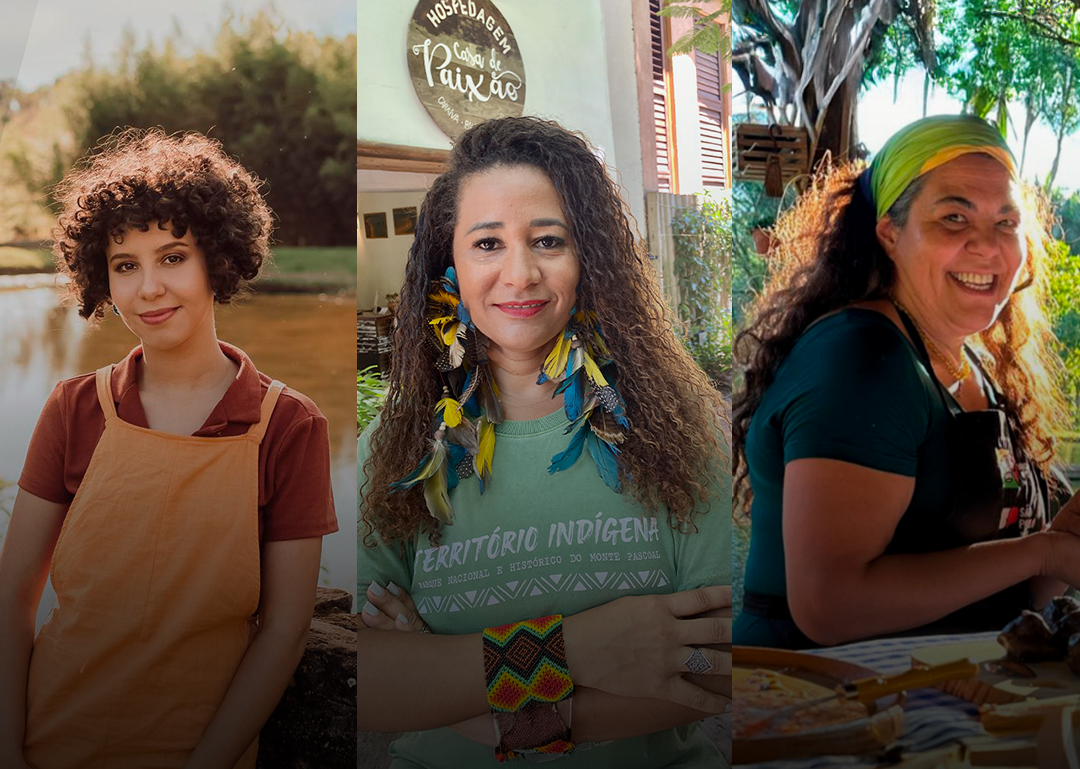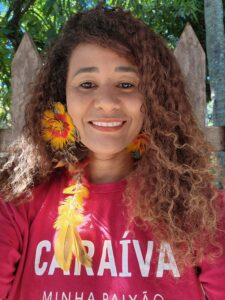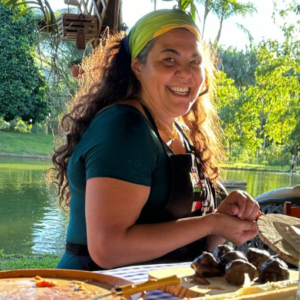
At Raízes Sustainable Development, female entrepreneurship is one of the central pillars of our work. We believe that promoting gender equality and empowering women and girls is fundamental to sustainable development. Through projects that encourage financial autonomy and female leadership, we seek to create opportunities for more women to undertake and reach their full potential.
And today, in our chat with beneficiaries, we brought along three women representing Casa de Paixão, Palmitolândia and the Grupo Teatral A Flor de Maio to take a closer and more authentic look at this scenario. They shared their experiences, challenges and learnings along this entrepreneurial journey.
Check out this inspiring chat below!
Tatiana Paixão – Casa de Paixão Caraíva
 Located in charming Caraíva, Bahia, Casa de Paixão is a lodging enterprise that reflects the local culture and hospitality. Under the leadership of Tatiana Paixão, the pousada offers visitors an authentic experience, valuing the traditions, handicrafts and way of life of the community. The enterprise was part of the Programa Turismo + Sustentável, with the realization of CI-Brasil, carried out by Raízes and supported by WWF Brazil.
Located in charming Caraíva, Bahia, Casa de Paixão is a lodging enterprise that reflects the local culture and hospitality. Under the leadership of Tatiana Paixão, the pousada offers visitors an authentic experience, valuing the traditions, handicrafts and way of life of the community. The enterprise was part of the Programa Turismo + Sustentável, with the realization of CI-Brasil, carried out by Raízes and supported by WWF Brazil.
Raízes DS: What was it like for you to start a business in the tourism and hospitality sector in Caraíva, a destination that has grown but still faces some challenges?
Tatiana Paixão: Entrepreneurship here is a daily challenge. It’s not an easy path, but it requires determination, resilience and a lot of love for what we do. Every day, we overcome obstacles and move forward with persistence, believing in the positive impact of our work.
R: What were the main challenges you faced as a woman entrepreneur in your sector and region?
T: As a woman, one of the most difficult challenges is the lack of credibility due to the fact that I’ve been running the business on my own since its inception. You often have to constantly prove your ability to manage and make things happen, something that is not always required of other entrepreneurs.
R: Is there a support network among women entrepreneurs that has helped you along the way? How do you see the importance of this support?
T: I didn’t have a support network. Having that support would have been fundamental for sharing challenges, exchanging experiences and strengthening the entrepreneurial journey.
R: What was it like for you to take part in the Tourism + Sustainability Program, and what were the main things you learned that helped you develop Casa de Paixão?
T: It was an incredible experience! It opened up new perspectives, broadened my networking – connections I still have today – and gave me the courage to take on new journeys.
Gabi Araújo – Palmitolândia
 At the head of Palmitolândia is Gabi Araújo, a visionary woman who combines sustainable production and environmental conservation. Her agro-ecological enterprise is dedicated to growing and selling organic heart of palm, promoting agricultural practices that respect biodiversity and guarantee income for the community involved. The enterprise was part of the United Nations Development Programme (UNDP Brazil) Project Accelerating Socio-Biodiversity Businesses with a focus on the Cerrado and Atlantic Forest, supported by the Humanize Institute and the Raízes SD methodology.
At the head of Palmitolândia is Gabi Araújo, a visionary woman who combines sustainable production and environmental conservation. Her agro-ecological enterprise is dedicated to growing and selling organic heart of palm, promoting agricultural practices that respect biodiversity and guarantee income for the community involved. The enterprise was part of the United Nations Development Programme (UNDP Brazil) Project Accelerating Socio-Biodiversity Businesses with a focus on the Cerrado and Atlantic Forest, supported by the Humanize Institute and the Raízes SD methodology.
Raízes DS: How was the experience of innovating in palm heart production and tourism in an agricultural sector that is often dominated by large companies and traditional producers?
Gabi: Investing in the union between gastronomy, agriculture and tourism has been an extremely rewarding experience. I work in a sector dominated by large companies and traditional producers, where hearts of palm are treated as a commodity, and this has always bothered me. For 20 years, I’ve tried to show that this model is unsustainable, because it undervalues those at the bottom of the chain: the rural producer. Many factories pay more for the glass, lid and label than for the palm heart itself – this is a system that exploits itself.
But instead of continuing to fight against this system, I decided to create my own. Today, I operate independently, with the freedom to do things differently and expand the market. Every tourist who comes to ‘palmitar’ with me leaves with a new outlook on hearts of palm. If they used to eat a glass, they now try new possibilities, such as a vegan caprese, a Romeo and Juliet with palm hearts, or one of the more than a thousand recipes we have developed.
More than a business, this is a life project. It proves that it is possible to build a fairer market, where everyone wins: the producer, who receives a decent wage; the consumer, who discovers new ways of eating; and nature, which is preserved. When I put pupunha on people’s plates, I help keep the juçara standing in the forest. My dream has always been to turn the heart of palm into our ‘white gold’, and we’re achieving that – be it with innovative dishes, heart of palm beer or even brooms made from it. Change is possible when we believe in it.
R: How do you perceive the impact of female entrepreneurship on strengthening the community where you work?
G: I’m a mother, not only of my 13-year-old son, but also of Palmitolândia. And I realize that this impact goes beyond my business – people come to me with that look of ‘it’s possible to do it differently, can you teach me? This has happened frequently, so much so that I’ve already set up some workshops to teach mainly in schools (…)
Ibelieve that being a woman entrepreneur brings a special eye for detail. Little things take on meaning, like turning a palm leaf into a decorated broom – which here becomes a big event. The child sees his father cutting up the palm heart and then comes back to play with the leaf, taking photos as if he were flying on Harry Potter’s broomstick. In this way, we convey the message in a light and fun way.
My grandmother Ines always said that the secret of life is to take everything simply, lightly and with a bow instead of a knot. Female entrepreneurship has this strength: it undoes knots, builds bridges and creates bonds. It doesn’t mean it’s easy – you step in the mud, you get up to your knees in it – but the path becomes more colorful, more playful, almost like a Wonderland. And that has made all the difference to my career.
R: How does Palmitolândia balance tradition and innovation in palm heart production, and how can this model inspire other women to become entrepreneurs in the agricultural sector?
G: I’m always looking for creative ways to reinvent what already exists. The secret is to think outside the box. We still sell industrialized hearts of palm, but we also transform them: we sell hearts of palm in the shape of hearts, in the shape of animals, we make hearts of palm beer, pâté, sushi – we add value to this jewel of nature. Our goal goes beyond commerce, it’s to educate consumers to eat more and better, in a sustainable way.
For a long time, I heard that ‘real palm heart’ was only the jussara. But the truth is that pupunha is the most sustainable alternative – just as tasty, without the need to cut down a palm tree that took eight years to grow. So, as well as creating new products, we’re transforming the way people see the heart of palm. When a tourist leaves here saying that their perception has changed, I know that we are creating a ‘palmitolover’ – and that means one more juçara standing in the Atlantic Forest.
Palmitolândia exists because it was built by many hands. We work on the basis of a collaborative, creative and sustainable economy, forming networks with partners such as the Grande Reserva Mata Atlântica and the Fundação Florestal. Here, tradition and innovation go hand in hand: we transform raw materials into value, whether through tourism, bio-jewelry, paper, juçara juice or even palm heart beer. My wish, especially in this Women’s Month, is that more women venture into the field and that we can further strengthen our network of female entrepreneurs.
Millena Muniz – Grupo teatral A Flor de Maio
The A Flor de Maio Theater Group is made up of four talented actresses from Itabirito – MG: Millena, Bárbara, Larissa and Júlia, who have found a way to tell stories in theater, with a focus on producing shows, corporate theater, art workshops and education. The group strives to produce engaged, critical and excellent art that promotes a more intimate experience with the audience. The group was part of the project Projeto de Desenvolvimento Territorial e Transformação Social de Itabirito-MG.
Raízes DS: What are the challenges of entrepreneurship in culture and theater and how do you manage to stay active on the cultural scene?
Millena: One of the biggest challenges is the financial instability within the area, which forces us to have complementary jobs and ends up affecting the amount of time we could invest in the group. In addition, the lack of consistent public policies for culture and the devaluation of artistic work make the path even more challenging.
At Flor de Maio, we’ve managed to stay active by building support networks, partnerships and a diverse range of activities that goes beyond performances. We create training projects, interventions and seek out public notices and collaborations with other groups and collectives. In addition, the formation of the group is based on a lot of professionalism, but above all on respect between the members and good communication. These elements are essential to ensure the continuity and strength of our work.
R: What opportunities do you see for female entrepreneurship in Brazil today and what still needs to change so that more women can become entrepreneurs?
M: Maybe it’s not the solution to all the world’s problems, but for sure, female entrepreneurship is a path to many possibilities, new business models and the reversal of many mechanisms created by men. The necessary change is the creation of opportunities for women in the market and time! We need less overburdened women. With time for themselves, for their interests, desires and ambitions.
It is necessary for public policies to take care of and welcome this category, thinking about projects that distribute quotas, that welcome the children of these women so that they can undertake, that make historical reparations, creating opportunities that have been denied us for a long time.
R: How can theater be a tool for social transformation and female empowerment, especially in smaller cities?
M: Theater and art by essence is a path of dialogue between the work and the audience. A way of reading oneself and the world. A sensitive path that tells of our history and the future we build as humanity and society. With that in mind, the possibilities are many! Our theater is a very intimate, connected and sensitive work. We’re from Minas Gerais (laughs), we’re a group of women and that says a lot about our culture, our touch, our “jeitim”. In the countryside, tete a tete is strong and it transforms! Being a women’s group in the interior of Minas Gerais is already an act of resistance, empowerment and transformation.
With our productions we often bring to the stage women’s issues that are important to discuss and see. This is how we see how our work in the countryside can contribute to transformations and to women’s, race and gender issues. With grace, good prose and the production of critical, quality and professional art.
The stories of these women entrepreneurs show that, despite the challenges, it is possible to build fairer, more innovative and sustainable paths. Women’s entrepreneurship not only strengthens the local economy, but also transforms realities, inspires new leaders and generates positive impacts that go beyond business.
This Women’s Month, we celebrate the courage, creativity and resilience of these entrepreneurs who, with their projects, leave a deep mark on their communities. May their careers continue to open doors and encourage other women to dream, achieve and strengthen this network of transformation.


